Steering Linkage Inner Tie Rod Replacement Magnasteer
Tools Required
J 34028 Inner Tie Rod Wrench
Disassembly Procedure
- To remove the rack and pinion boot and the breather tube. Refer to Steering Gear Boot and Breather Tube Replacement - Off Vehicle .
- Place the gear in a vise.
- Remove the shock dampener (6) from the inner tie rod assembly (4).
- Slide the shock dampener (6) back on the rack (5).
- Place a pipe wrench on the rack (5) next to the inner tie rod housing (4).
- Place a wrench on the flats of the inner tie rod housing (4).
- Rotate the inner tie rod housing (4) counterclockwise, while holding the rack stationary, until the inner tie rod separates from the rack (5).
- Remove the shock dampener (3) from the inner tie rod housing (2).
- Slide the shock dampener (3) back on the rack (5).
- Place a pipe wrench on the rack.
- Place a wrench on the flats of the inner tie rod housing (2).
- Rotate the inner tie rod housing (2) counterclockwise, while holding the rack stationary, until the inner tie rod (1) separates from the rack (5).
- If female rack (1) and male inner tie rod (3), remove the old LOCTITE® from the threads (2) of the inner tie rod (3) and the rack (1).
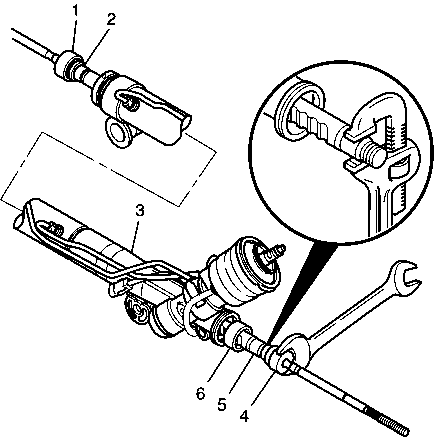
Notice: Do not change the steering gear preload adjustment before moving the inner tie rod from the steering gear. Changing the steering gear preload adjustment before moving the inner tie rod could result in damage to the pinion and the steering gear.
Notice: The pipe wrench must be placed at the valve end of the steering gear and positioned up against the inner tie rod housing. Placing the pipe wrench in any other location will cause damage to the steering gear.
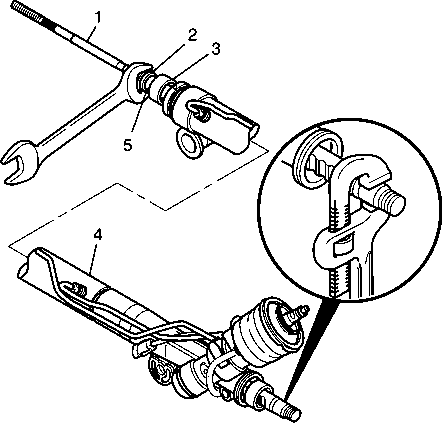
Notice: The pipe wrench must be placed at the valve end of the steering gear and positioned up against the inner tie rod housing. Placing the pipe wrench in any other location will cause damage to the steering gear.
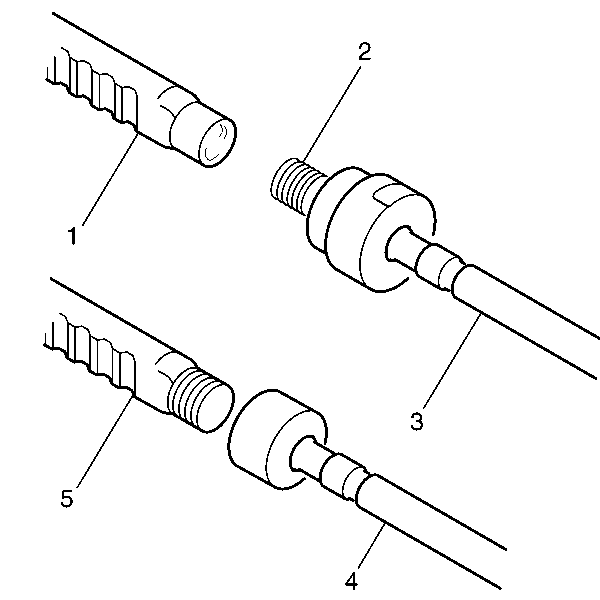
If male rack (5) and female inner tie rod (4) LOCTITE® will not be present.
Assembly Procedure
- Slide the shock dampener (4) forward onto the rack (3).
- If female rack (3) and male inner tie rod (2), apply LOCTITE® 262 (or equivalent) to the inner tie rod threads.
- Attach the inner tie rod onto the rack (3).
- Place a pipe wrench on the rack (3) next to the inner tie rod housing (2).
- Place a torque wrench and J 34028 on the flats of the inner tie rod housing (2).
- Slide the shock dampener (2) forward onto the rack.
- If female rack and male inner tie rod (1), apply LOCTITE® 262 (or equivalent) to the inner tie rod threads.
- Attach the inner tie rod (1) onto the rack.
- Place a pipe wrench on the rack next to the inner tie rod housing (4).
- Place a torque wrench and J 34028 on the flats of the inner tie rod housing (7).
- Place the inner tie rod assembly (2) in a vise.
- Stake both sides of the female inner tie rod assembly housing to the male rack (1).
- Insert a 0.25 mm gage (1) between the male rack (2) and the female inner tie rod housing in order to check both stakes. The feeler gauge (1) must not pass between the rack and the housing stake.
- Slide the shock dampener (2) over the inner tie rod housing (3) until the front lip of the shock dampener (2) bottoms against the inner tie rod housing (3).
- To assemble the rack and pinion boot and the breather tube. Refer to Steering Gear Boot and Breather Tube Replacement - Off Vehicle .
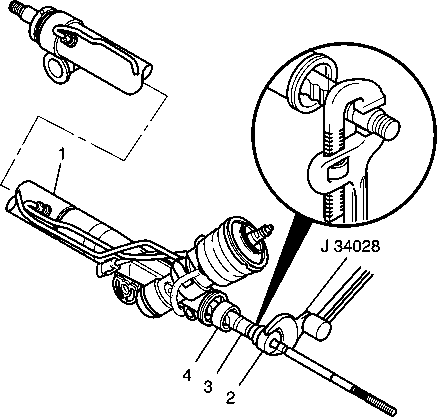
Important: Threads must be clean prior to LOCTITE® application. Check LOCTITE® (or equivalent) container for expiration date. Use only enough LOCTITE® to evenly coat threads.
If male rack (3) and female inner tie rod (2) do not apply LOCTITE®.Notice: The pipe wrench must be placed at the valve end of the steering gear and positioned up against the inner tie rod housing. Placing the pipe wrench in any other location will cause damage to the steering gear.
Notice: Use the correct fastener in the correct location. Replacement fasteners must be the correct part number for that application. Fasteners requiring replacement or fasteners requiring the use of thread locking compound or sealant are identified in the service procedure. Do not use paints, lubricants, or corrosion inhibitors on fasteners or fastener joint surfaces unless specified. These coatings affect fastener torque and joint clamping force and may damage the fastener. Use the correct tightening sequence and specifications when installing fasteners in order to avoid damage to parts and systems.
Tighten
Tighten the inner tie rod to 100 N·m (74 lb ft).
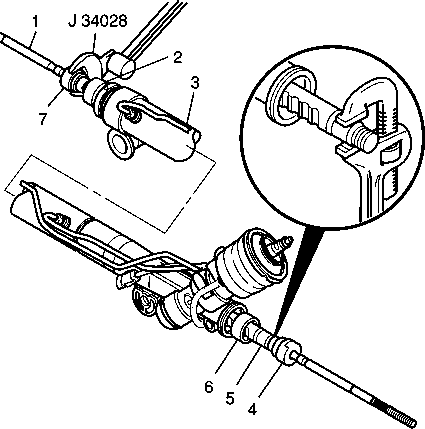
Important: Threads must be clean prior to LOCTITE® application. Check LOCTITE® (or equivalent) container for expiration date. Use only enough LOCTITE® to evenly coat threads.
If male rack and female inner tie rod (1) do not apply LOCTITE®.Notice: The pipe wrench must be placed at the valve end of the steering gear and positioned up against the inner tie rod housing. Placing the pipe wrench in any other location will cause damage to the steering gear.
Tighten
Tighten the inner tie rod to 100 N·m (74 lb ft).
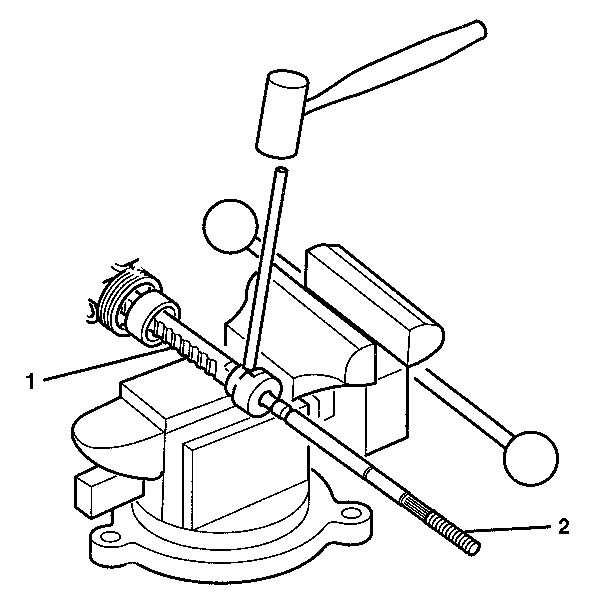
Important: If female rack (1) and male inner tie rod (2) do not stake. If male rack (1) and female inner tie rod (2) you must stake.
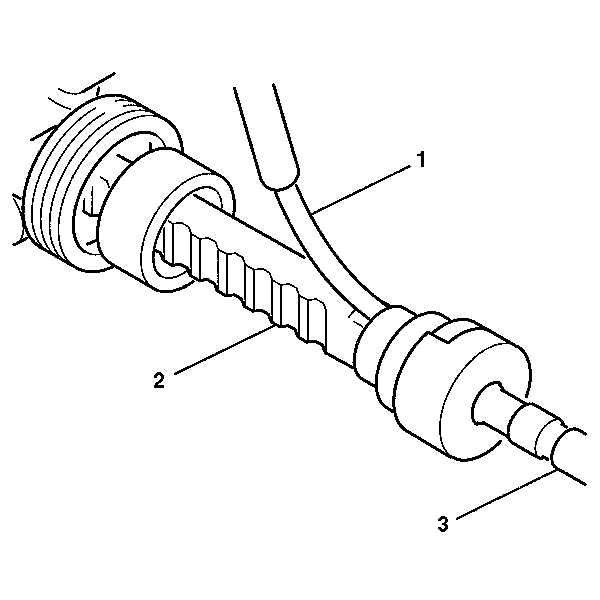
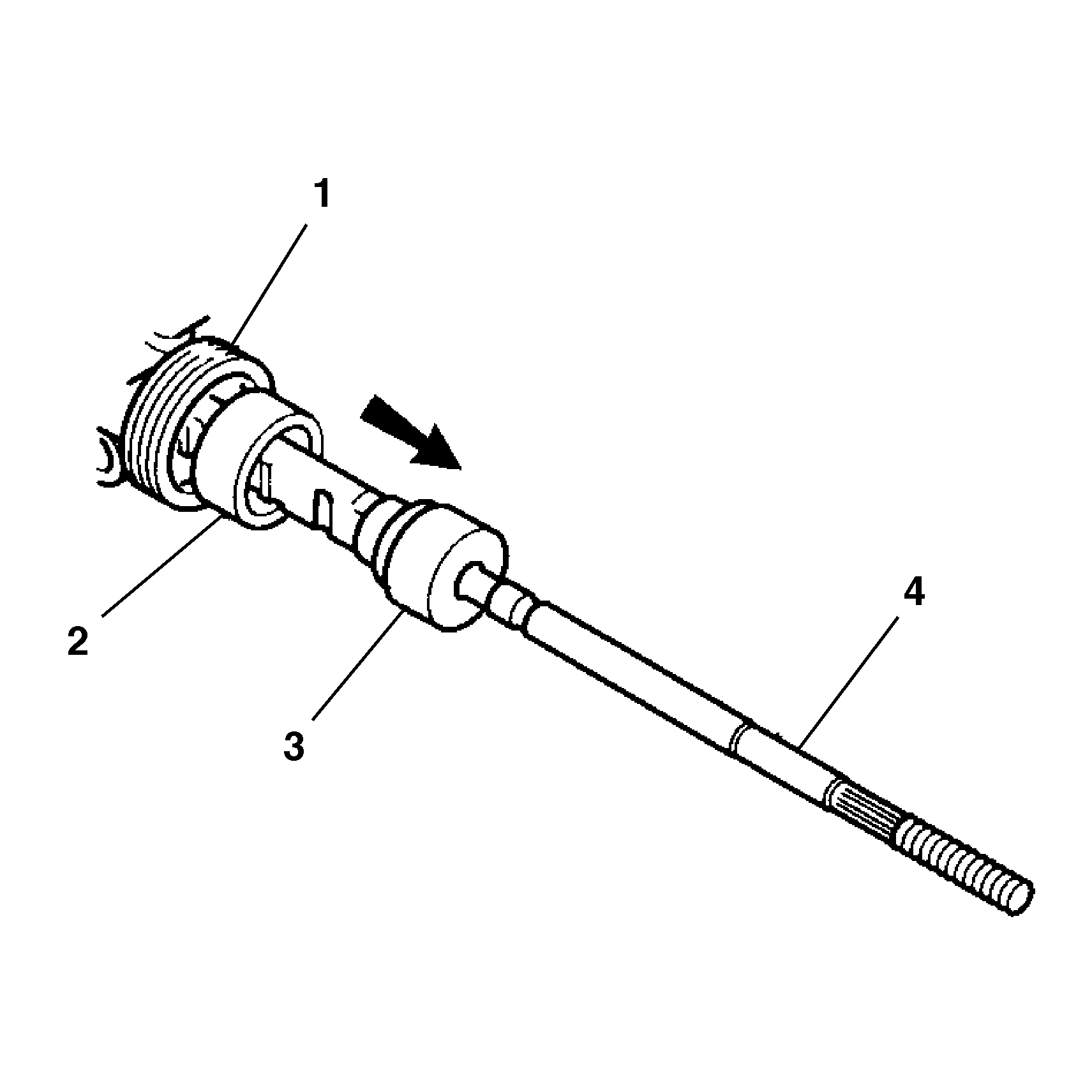
Steering Linkage Inner Tie Rod Replacement Quiet Valve
Tools Required
J 34028 Inner Tie Rod Wrench
Disassembly Procedure
- To remove the rack and pinion boot and the breather tube. Refer to Steering Gear Boot and Breather Tube Replacement - Off Vehicle .
- Place the gear in a vise.
- Remove the shock dampener (4) from the inner tie rod housing (6).
- Slide the shock dampener (4) back on the rack (5).
- Place a pipe wrench on the rack (5) next to the inner tie rod housing (6).
- Place a wrench on the flats of the inner tie rod housing (6).
- Rotate the inner tie rod housing (6) counterclockwise, while holding the rack stationary, until the inner tie rod separates from the rack (5).
- Remove the shock dampener (3) from the inner tie rod housing (2).
- Slide the shock dampener (3) back on the rack (5).
- Place a pipe wrench on the rack.
- Place a wrench on the flats of the inner tie rod housing (2).
- Rotate the inner tie rod housing (2) counterclockwise, while holding the rack stationary, until the inner tie rod (1) separates from the rack (5).
- If female rack (1) and male inner tie rod (3), remove the old LOCTITE® from the threads (2) of the inner tie rod and the rack.
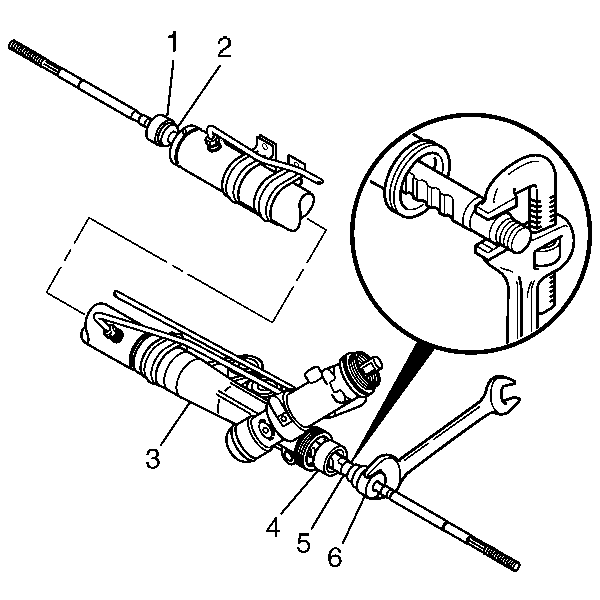
Notice: Do not change the steering gear preload adjustment before moving the inner tie rod from the steering gear. Changing the steering gear preload adjustment before moving the inner tie rod could result in damage to the pinion and the steering gear.
Notice: The pipe wrench must be placed at the valve end of the steering gear and positioned up against the inner tie rod housing. Placing the pipe wrench in any other location will cause damage to the steering gear.
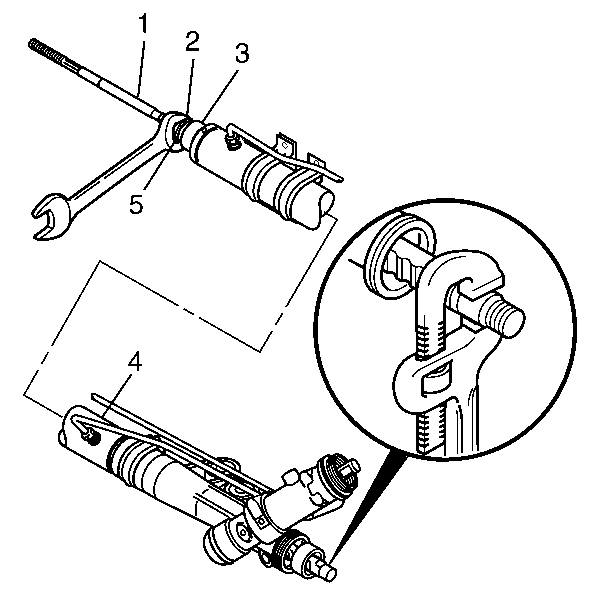
Notice: Do not change the steering gear preload adjustment before moving the inner tie rod from the steering gear. Changing the steering gear preload adjustment before moving the inner tie rod could result in damage to the pinion and the steering gear.
Notice: The pipe wrench must be placed at the valve end of the steering gear and positioned up against the inner tie rod housing. Placing the pipe wrench in any other location will cause damage to the steering gear.

If male rack (5) and female inner tie rod (4) LOCTITE® will not be present.
Assembly Procedure
- Slide the shock dampener (4) forward onto the rack (3).
- If female rack (3) and male inner tie rod (2), apply LOCTITE® 262, or equivalent, to the inner tie rod threads.
- Attach the inner tie rod onto the rack (3).
- Place a pipe wrench on the rack (3) next to the inner tie rod housing (2).
- Place a torque wrench and J 34028 on the flats of the inner tie rod housing (2).
- Slide the shock dampener (2) forward onto the rack.
- If female rack and male inner tie rod (1), apply LOCTITE® 262, or equivalent, to the inner tie rod threads.
- Attach the inner tie rod (1) onto the rack.
- Place a pipe wrench on the rack next to the inner tie rod housing (4).
- Place a torque wrench and J 34028 on the flats of the inner tie rod housing (7).
- Place the inner tie rod assembly (2) in a vise.
- Stake both sides of the female inner tie rod assembly housing to the male rack.
- Insert a 0.010 inch gage (1) between the rack (2) and the inner tie rod housing in order to check both stakes. The feeler (1) must not pass between the rack and the housing stake.
- Slide the shock dampener (2) over the inner tie rod housing (3) until the front lip of the shock dampener (2) bottoms against the inner tie rod housing (3).
- To assemble the rack and pinion boot and the breather tube. Refer to Steering Gear Boot and Breather Tube Replacement - Off Vehicle .
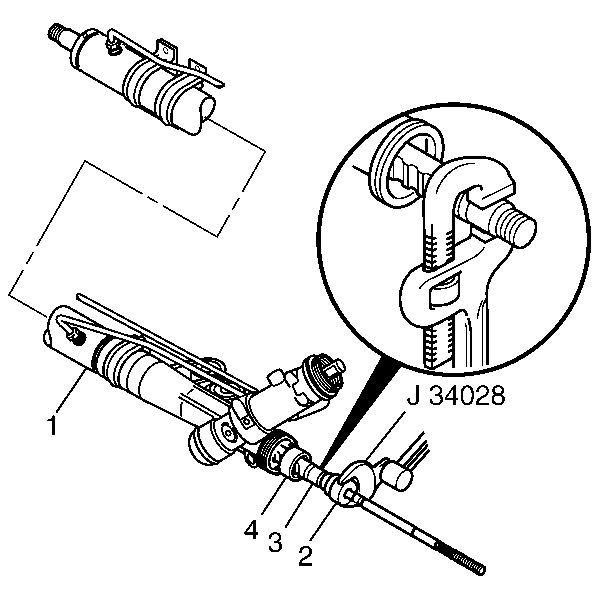
Important: Threads must be clean prior to LOCTITE® application. Check LOCTITE®, or equivalent, container for expiration date. Use only enough LOCTITE® to evenly coat threads.
If male rack (3) and female inner tie rod (2) do not apply LOCTITE®.Notice: The pipe wrench must be placed at the valve end of the steering gear and positioned up against the inner tie rod housing. Placing the pipe wrench in any other location will cause damage to the steering gear.
Notice: Refer to Fastener Notice in the Preface section.
Tighten
Tighten the inner tie rod to 100 N·m (74 lb ft).
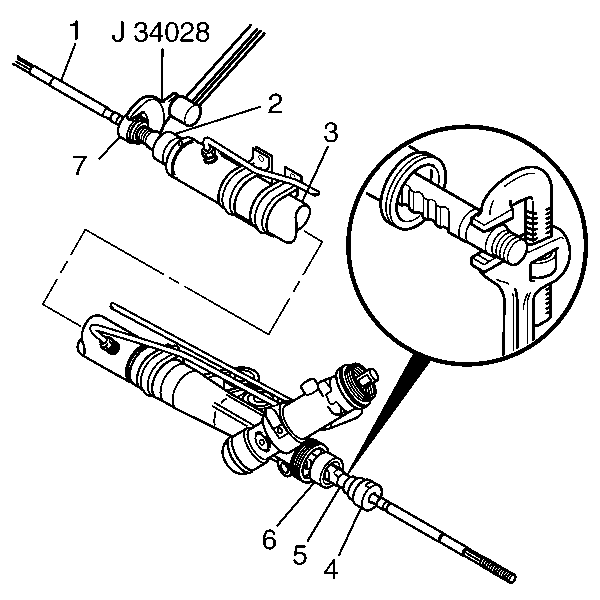
Important: Threads must be clean prior to LOCTITE® application. Check LOCTITE®, or equivalent, container for expiration date. Use only enough LOCTITE® to evenly coat threads.
If male rack and female inner tie rod (1) do not apply LOCTITE®.Notice: The pipe wrench must be placed at the valve end of the steering gear and positioned up against the inner tie rod housing. Placing the pipe wrench in any other location will cause damage to the steering gear.
Tighten
Tighten the inner tie rod to 100 N·m (74 lb ft).

Important: If female rack (1) and male inner tie rod (2) do not stake. If male rack (1) and female inner tie rod (2) you must stake.


